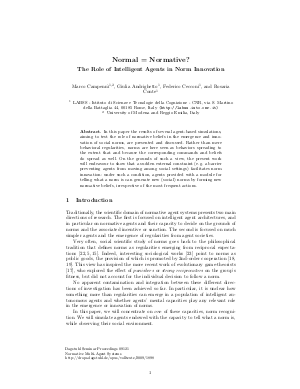Normal = Normative? The Role of Intelligent Agents in Norm Innovation
Authors Giulia Andrighetto, Marco Campennì, Federico Cecconi, Rosaria Conte
-
Part of:
Volume:
Dagstuhl Seminar Proceedings, Volume 9121
Part of: Series: Dagstuhl Seminar Proceedings (DagSemProc) - License:
 Creative Commons Attribution 4.0 International license
Creative Commons Attribution 4.0 International license
- Publication Date: 2009-03-11
File

PDF
DagSemProc.09121.21.pdf
- Filesize: 247 kB
- 14 pages
Document Identifiers
Subject Classification
Keywords
- Norm emergence
- agent based simulation
Metrics
- Access Statistics
-
Total Accesses (updated on a weekly basis)
0Document
0Metadata
Abstract
In this paper the results of several agent-based simulations, aiming to test the role of normative beliefs in the emergence and innovation of social norms, are presented and discussed. Rather than mere behavioral regularities, norms are here seen as behaviors spreading to the extent that and because the corresponding commands and beliefs do spread as well. On the grounds of such a view, the present work will endeavour to show that a sudden external constraint (e.g. a barrier preventing agents from moving among social settings) facilitates norm innovation: under such a condition, agents provided with a module for telling what a norm is can generate new (social) norms by forming new normative beliefs, irrespective of the most frequent actions.
Cite As Get BibTex
Giulia Andrighetto, Marco Campennì, Federico Cecconi, and Rosaria Conte. Normal = Normative? The Role of Intelligent Agents in Norm Innovation. In Normative Multi-Agent Systems. Dagstuhl Seminar Proceedings, Volume 9121, pp. 1-14, Schloss Dagstuhl – Leibniz-Zentrum für Informatik (2009)
https://doi.org/10.4230/DagSemProc.09121.21
BibTex
@InProceedings{andrighetto_et_al:DagSemProc.09121.21,
author = {Andrighetto, Giulia and Campenn\`{\i}, Marco and Cecconi, Federico and Conte, Rosaria},
title = {{Normal = Normative? The Role of Intelligent Agents in Norm Innovation}},
booktitle = {Normative Multi-Agent Systems},
pages = {1--14},
series = {Dagstuhl Seminar Proceedings (DagSemProc)},
ISSN = {1862-4405},
year = {2009},
volume = {9121},
editor = {Guido Boella and Pablo Noriega and Gabriella Pigozzi and Harko Verhagen},
publisher = {Schloss Dagstuhl -- Leibniz-Zentrum f{\"u}r Informatik},
address = {Dagstuhl, Germany},
URL = {https://drops.dagstuhl.de/entities/document/10.4230/DagSemProc.09121.21},
URN = {urn:nbn:de:0030-drops-18980},
doi = {10.4230/DagSemProc.09121.21},
annote = {Keywords: Norm emergence, agent based simulation}
}
